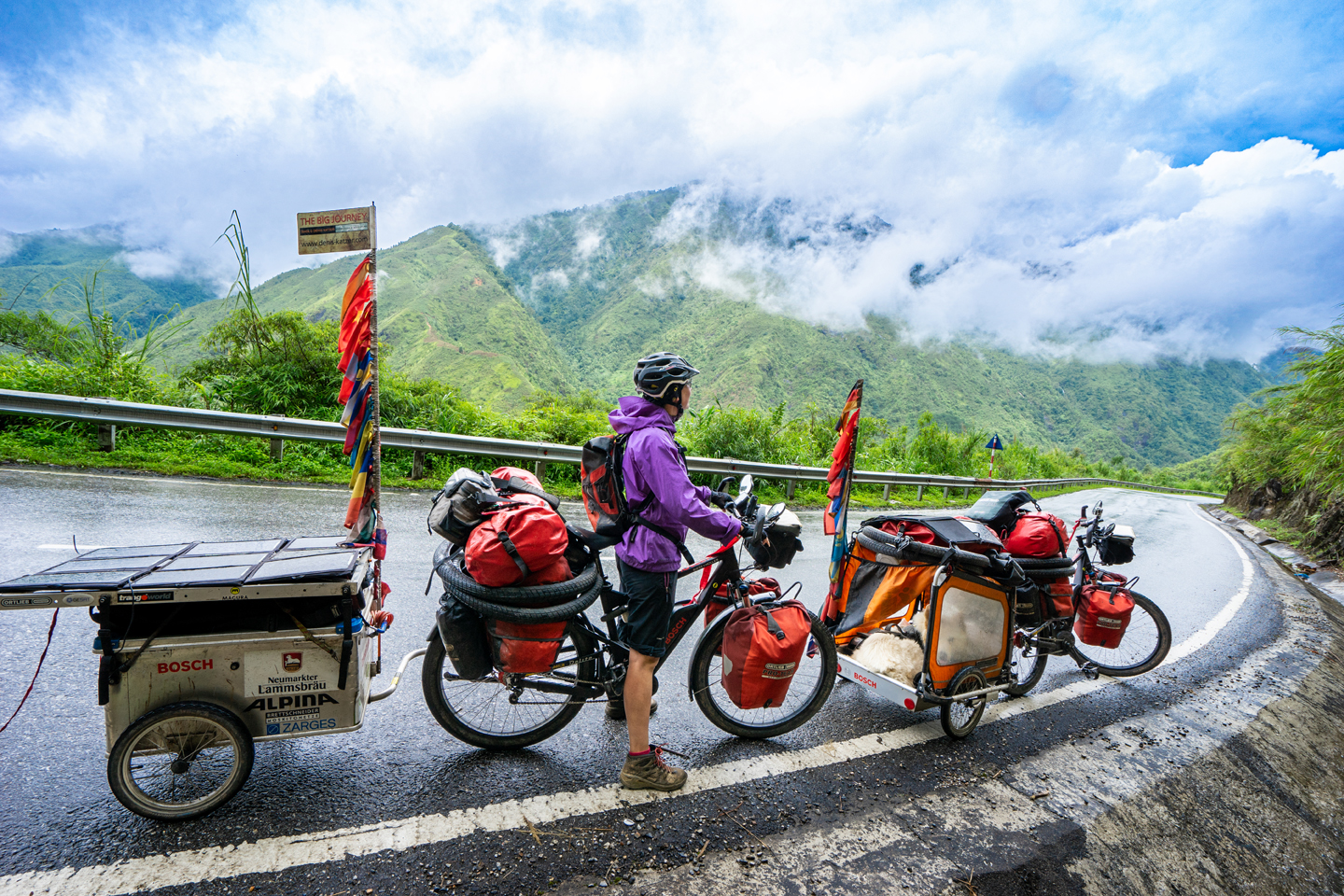
Irkutsk, the capital of Siberia
N 52°16'26.0'' E 104°18'16.0''
Day: 47-48
Sunrise:
06:22 – 06:09
Sunset:
21:56 – 21:47
As the crow flies:
40.81 Km
Daily kilometers:
56.88 Km
Total kilometers:
12001.77 Km
Soil condition:
Asphalt
Temperature – Day (maximum):
30 °C
Temperature – day (minimum):
20 °C
Temperature – Night:
10 °C
Latitude:
52°16’26.0”
Longitude:
104°18’16.0”
Maximum height:
519 m above sea level
Maximum depth:
420 m above sea level
Time of departure:
09.45 a.m.
Arrival time:
3.10 p.m.
Average speed:
14.54 Km/h
We stop for a photo at the monstrous town sign of Irkutsk. Somehow we still can’t quite believe it. Finally, after 12,001 kilometers of cycling under our own steam, we have reached the city we have been talking about for years. What an exhilarating feeling. I raise my fist to the sky and stick my thumb up. Then it goes on. The city’s heavy traffic sucks us in. There is no consideration here, no mercy for us little cyclists. With extreme concentration, we thread our way through the pile of metal. Become part of the snake that winds its way over bridges and crossroads. Then it splits up. Mutates into a multi-armed monster. Straight ahead? Left or right? No one there to ask. “Straight ahead,” I decide, and we let our bikes roll over the black, partly potholed asphalt. We pass the mighty Angara, which flows into the great Baikal just 60 kilometers from here. On the other side of the riverbank we can see the tracks of the Trans-Siberian Railway, which connected the city with the outside world as early as 1898 and contributed to the economic boom of the metropolis. Irkutsk was founded as a Cossack base as early as 1652. Due to its central location to China and Mongolia, it developed into a very important trading post with the two neighboring countries. Today, the city has almost 600,000 inhabitants and is an industrial, economic and cultural center. In addition to the manufacture of aircraft, vehicles, textiles and building materials and the production of mining equipment, it also has museums, theaters, a symphony orchestra and several universities.
“Just follow me. I’ll take you to your hotel,” says an angel in human form. We follow the four-wheel drive vehicle and reach the beautiful city center. Together with Tomsk, Irkutsk is one of the most beautiful cities in Siberia. At least that’s how we feel. To the left and right of the main road are little streets and alleyways. Poplar trees line the arterial road and provide shade for pedestrians. Marketplaces are bustling with activity. Vendors from many different countries offer their wares for sale. Life pulsates under a bright blue sky. Expensive stores, cafés and restaurants line the boulevard. Fashionably dressed people stroll through the alleyways. Music can be heard from various loudspeakers. Beautiful, sometimes magnificent houses and merchants’ villas from the 19th century. delight our eyes and alternate with the old, typical Siberian, stylish wooden houses, bent by age. In hardly any other Siberian city have we seen so few traces of the ugly new socialist buildings. “This is your hotel,” says our Siberian angel, who has guided us through the city center to get here. “Thank you very much,” we reply and are pleased not to have gotten lost once on the long journey. “Looks fantastic,” says Tanja as we stand in front of the large, luxurious-looking Hotel Europa. “I don’t think they check cyclists in here often,” I say and report to reception. “It’s a good thing you made a reservation. We are fully booked,” praises the nice woman at reception in good English. Only one bike fits in the small luggage compartment. We have to put the other one in the chamber in front of it. Then we take the elevator up to the third floor and get our equipment into the small room, which costs 3,500 roubles (79.54 euros).
In the afternoon, we take the minibus to the harbor and buy the boat tickets to Olkhon Island. Then we look for a restaurant. As we are in a big city, the prices are the same as here in Europe. A beer costs between 170 and 200 roubles (3.86 and 4.54 euros) and a salad around 400 to 500 roubles (9 to 11.36 euros) – far too expensive for long-term travelers. We buy our food in a supermarket and, like other young Russians, sit down on a park bench. “It’s much nicer than in a restaurant,” I say, looking at the people strolling past. “I think so too. Above all, it tastes better,” laughs Tanja.

